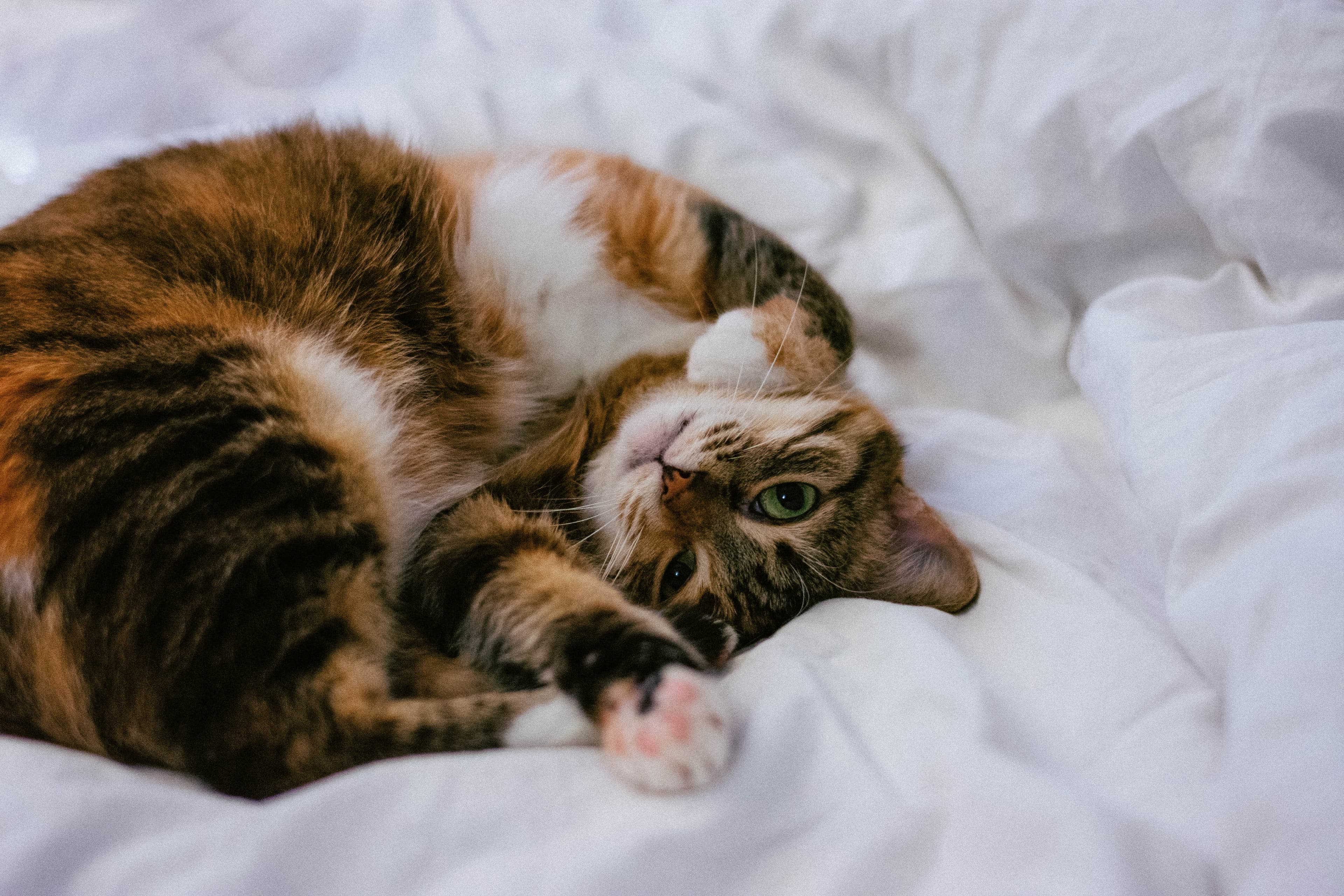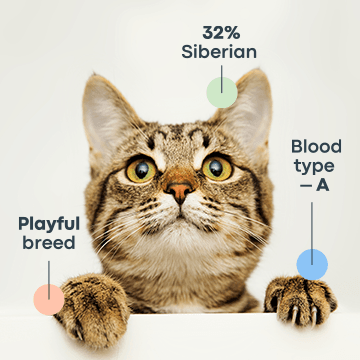For many, the purring sound of a cat nestled comfortably on their lap is the epitome of happiness. If you're seeking a pet friend who's particularly generous with affection, some cat breeds are more predisposed to snuggly behavior than others. Now, let’s delve into some of the most affectionate cat breeds.
Abyssinian
The is often considered one of the most active and playful breeds. Their intelligence and curiosity make them natural explorers who love to climb and investigate their surroundings. They're often described as "dog-like" in their loyalty, following their owners and participating in activities. However, they're not typically lap cats due to their high energy levels; they prefer interacting with their owners through play and exploration.
Birman
cats are as beautiful in character as they are in appearance, with striking blue eyes and a silky coat. They're known for their gentle and patient demeanor, making them excellent companions for families with children. Birmans are also quite communicative and will express their desires with soft, melodious voices. Their balanced temperament means they enjoy playing but are just as happy to spend quiet time in a sunny spot or perched on a window sill.
Burmese
cats are very people-oriented. They thrive on human interaction and are known to suffer from separation anxiety if left alone for extended periods. This breed is often compared to dogs not only because of their need for companionship but also for their playful, puppy-like behavior. Burmese cats are intelligent, making them easy to train for tricks and commands, and they maintain a kitten-like demeanor well into adulthood.
Cornish Rex
The Cornish Rex, with their striking curly fur and large ears, are as charming in personality as they look. They remain kittenish and playful, entertaining their owners with acrobatic jumps and lively antics. They're also very clever and can be taught to fetch and perform tricks. Despite their slender bodies, they are hearty eaters and often seek out food, sometimes in the most unexpected places.
Scottish Fold
are distinguished by their unique folded ears, which give them an owl-like appearance. They're typically very sweet and calm, and they can get along well with children and other pets. They have a moderate activity level, enjoying play but also savoring moments of relaxation. Their voices are typically soft, and they communicate more with expressive eyes and body language than with vocalizations.
Persian
are one of the most laid-back breeds. Their tranquil nature makes them a good fit for quieter households. They prefer serene environments and can often be found lounging in comfortable spots around the home. Persians are not known for being exceptionally playful, but they enjoy interactive toys that allow them to engage in a dignified manner. Grooming is a significant consideration for Persians, as their long, luxurious coats require daily care.
Ragdoll
are as gentle and easygoing as they are affectionate. True to their name, they often go limp with pleasure when picked up. This breed is known for being particularly good with children and pets, displaying patience and a gentle demeanor. While they enjoy a good play session, they're not overly active and often prefer the company of their humans over high-energy antics. The Ragdoll is often at the top regarding the most friendly cat breeds.
Siamese
are one of the oldest and most well-known breeds. They are characterized by striking color points, large ears, and a sleek build. Siamese cats are very vocal and will "talk" with their owners with a distinctive voice. They crave interaction and are among the friendliest cats, often seeking out human company and a warm lap. Highly intelligent, they can be trained to perform tricks and enjoy interactive toys that challenge their problem-solving skills.
Tonkinese
Tonkinese cats blend the Burmese and Siamese breeds and have inherited the best traits from both. They're playful and energetic without being overly demanding. Their social nature means they dislike being alone for long periods and can get along well in homes with other pets. They're known for their gregarious and friendly nature, often welcoming guests with the same enthusiasm as they do their owners.
Breeds to Avoid
While it's important to note that individual personalities vary widely within any breed, certain cat breeds are known for being more independent or aloof. Breeds such as the Russian Blue, Bengal, and Sphynx may not consistently display the cuddly behavior of the most loving cat breeds. However, every cat is an individual, and there are always exceptions to the norm.
What Causes a Cat to Be Affectionate?
The affectionate nature of a cat often boils down to several interconnected factors:
Genetics
Just as with any other trait, affection can be inherited. Some cat breeds have been selectively bred for sociability and friendliness, which means their inclination to show love is part of their genetic makeup.
Early Socialization
Kittens that are exposed to humans and handled gently within their first few weeks of life typically grow up more comfortable and trusting around people. This period is crucial for developing positive associations with humans, which can result in more affectionate behavior as adults.
Environment
Cats raised in a peaceful and loving environment where they feel safe and secure are likelier to show affection. Conversely, those who have experienced trauma or neglect may be more distant and require time and patience to open up.
Learned Behavior
Cats often learn that showing affection is a way to receive it in return. If cats realize that cuddling or rubbing against their human leads to petting, treats, or verbal praise, they will likely repeat the behavior.
Individual Personality
Every cat is unique, with its own personality. Some are naturally more outgoing and affectionate, while others may be more reserved.
How to Make Your Cat a Lap Cat?
While not all cats will become lap cats—even with encouragement—there are ways to increase the likelihood of your cat seeking out your lap as a favorite resting place.
Start Young
If you have a kitten, start socialization early. Frequent, gentle handling can help kittens grow accustomed to human contact and enjoy it.
Provide Positive Reinforcements
Use treats and gentle petting as rewards when your cat shows interest in sitting with you. This positive reinforcement helps the cat associate your lap with good things.
Create a Cozy Environment
Ensure that the area where you'd like your cat to cuddle is comfortable and inviting. A soft blanket or a cushion on your lap can make the spot more appealing.
Invite, Don't Force
Allow your cat to come to you on their own terms. Forcing a cat to sit on your lap can be counterproductive, leading to avoidance.
Respect Your Cat's Boundaries
Not every cat wants to be a lap cat, and that's okay. Respect your cat's personality and preferences. Some may prefer to sit beside you rather than on you, and that form of companionship is just as valuable.
Conclusion
When considering bringing a new feline friend into your home, it's vital to understand that affectionate behavior in cats often depends on the individual pet's personality. If you're looking for the friendliest pet, consider adopting from a shelter where many loving mixed-breed cats are waiting for a home.
Remember, the best cat breeds for cuddling are those that align with your lifestyle and the amount of time you can dedicate to your pet. Whether purebred or mixed, there's a loving cat for every would-be pet owner.
Frequently Asked Questions
What is the most affectionate cat breed? What breed of cat is the friendliest?
The Ragdoll is often hailed as the friendliest and most affectionate breed, known for its placid nature and tendency to relax completely when held, which is how it got its name.
What cats are super affectionate?
Breeds like the Scottish Fold, Siamese, and Maine Coon are known to be super affectionate, often seeking constant companionship and interaction with their human families.
Which cat breed is the easiest to keep?
The American Shorthair is known for being one of the easiest breeds to keep due to its good-natured disposition, low-maintenance coat, and general healthiness.
How do I choose an affectionate cat?
Look for a cat that appears relaxed and comfortable around humans, seeks out interaction, and shows a gentle and curious demeanor, all good signs of an affectionate nature.





